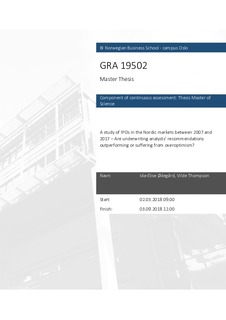A study of IPOs in the Nordic markets between 2007 and 2017 – Are underwriting analysts’ recommendations outperforming or suffering from overoptimism?
Master thesis
Permanent lenke
http://hdl.handle.net/11250/2578735Utgivelsesdato
2018Metadata
Vis full innførselSamlinger
Sammendrag
This thesis presents a study of the credibility on underwriting analysts’
recommendations issued on 100 initial public offerings (IPOs) in the Nordic
markets between 2007 and 2017. By following the methodology presented in a
study by Michaely and Womack (1999), we investigate four main hypotheses.
The first hypothesis investigates whether underwriting analysts issue biased
recommendations, this is referred to as the conflict of interest hypothesis. The
second hypothesis investigates whether underwriting analysts issue more
accurate recommendations as they benefit from superior information obtained in
the marketing and due diligence processes of the IPO, this is referred to as the
superior information hypothesis. The third hypothesis investigates whether
underwriting analysts attempt to boost stock prices of poor preforming IPOs.
The fourth hypothesis investigates whether the market discounts
recommendations issued by underwriting analysts immediately after the
announcement.
By investigating 274 buy recommendations in an event study, we find no
evidence that underwriting analysts issue biased recommendations. This indicate
no appearance of the potential conflict of interest in between investment banking
and the research department. Although we find that firms recommended by
underwriting analysts overall perform better, we cannot conclude that
underwriting analysts have superior information to others as the difference is not
significant. These findings conflict with the findings of Michaely and Womack
(1999). We present the implementation of new regulations and legislations in the
financial markets as one possible explanation to this. The analysis is extended to
test if there are characteristics that are more important for the performance of a
recommended IPO. We find some evidence for the conflict of interest hypothesis
on small sized IPOs. These results suggest that smaller IPOs, which is likely to
receive less analyst coverage, allow underwriter analysts to issue biased
recommendations. We find some evidence for the superior information
hypothesis for IPOs receiving six or more recommendations.
Beskrivelse
Masteroppgave(MSc) in Master of Science in Business, Finance - Handelshøyskolen BI, 2018
